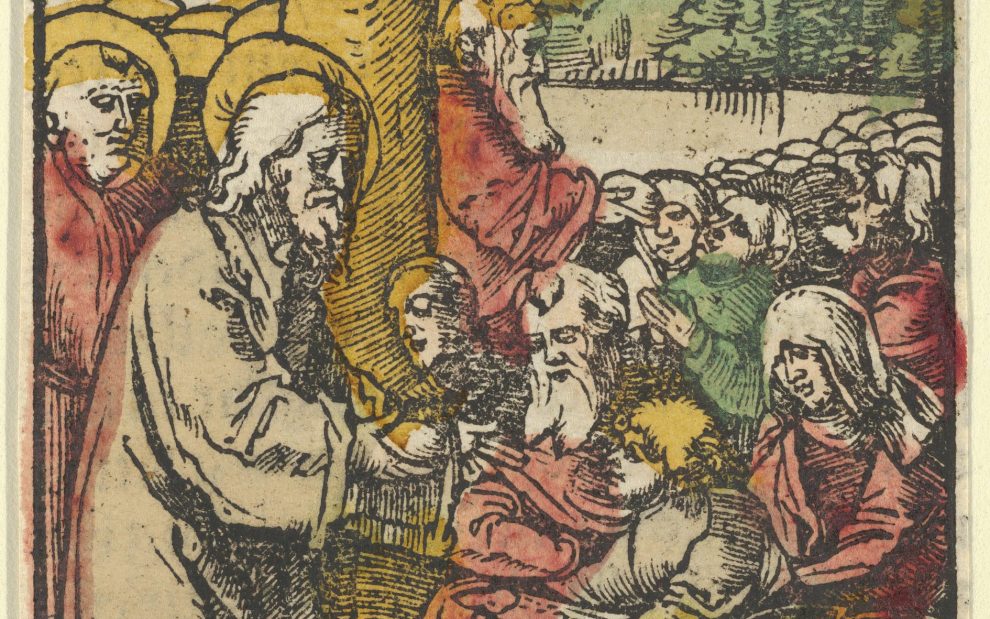Our first outing as a family of five, the day after we brought our youngest home from the hospital, was to the local WIC and Social Services office. Despite both working multiple jobs, my wife and I still qualified for government assistance. Despite immense privilege (I am a white, Ivy League-educated, heterosexual male), my family still qualified for government assistance.
My wife and I were surprised that we qualified. Surprised because we (errantly) believed that two gainfully employed adults should be able to afford groceries for their children. Surprised because we never imagined ourselves to be worthy recipients of government assistance.
But all this got me thinking about economy and solidarity. If younger generations are experiencing poverty at unprecedented rates, and if the gospels repeatedly encourage us to choose solidarity with the poor, what are we to make of unelected poverty? Can you have solidarity if you didn’t choose it?
Many Americans suffer from financial stress through no fault of their own. Nearly 50 percent of Americans rely on credit cards to cover essential living expenses, and more than 60 percent are living paycheck to paycheck. Annually, more than 12 million women, infants, and children—or “mommies, babies, and kids,” as my 4-year-old says—are eligible for WIC. In 2022, approximately 40 percent of all American infants received WIC nutritional benefits. Add to this the 22 million households that receive food stamps (Supplemental Nutrition Assistance Program), the 91.5 million individuals enrolled in Medicaid and CHIP (Children’s Health Insurance Program), and the 30 million children who receive free or reduced school lunches, and financial precarity starts to look commonplace, par for the course.
For each of today’s generations, economic stability is becoming less of an assumed opportunity and more of a luxury; research reveals that younger generations (Millennials and beyond) are making less money than their parents’ generations and that they are finding “lower status” employment. By the numbers, this reversal of the American dream is staggering. My grandparents’ generation had a greater than 90 percent chance of earning more than their parents, while members of my generation (Millennials) have about a 4-in-10 chance of earning more than their parents.
If you drill down further, the stats look even worse. Poverty and precarity are not equal-opportunity maladies: Women, people of color, and immigrants all have it worse, suffering lower wages and higher poverty rates.
With snappy titles such as Born to Be Blessed, You’re Supposed to Be Wealthy, and Unclaimed Riches, plenty of Christian writers and preachers are ready to sell you a more hopeful perspective on finances. To be clear, I am confounded by large swaths of the Bible, but I am fairly confident of a few hermeneutic foundations: The Bible’s overwhelming message is one of love, and the divine realm of love—the realm of heaven that Jesus describes—is one of equity, fairness, and the preferential treatment of the poor, the outcast, the so-called “least of these.” In short, the Bible might be ambiguous on many fronts, but when it comes to wealth-hoarding and poverty, the message is consistent and clear: You cannot serve God and money (Matt. 6:24); putting our faith in finances leads to failure (Prov. 11:28); and the love of money begets misery (1 Tim. 6:10).
Even if we toss out money-hungry theologies like those hawked by proponents of the prosperity gospel, the issue of poverty and our relation to it remains. In A Theology of Liberation, Gustavo Gutiérrez offers us some guidance to our dilemma. He draws a distinction between spiritual and material poverty: “Material poverty is a scandalous condition. Spiritual poverty is an attitude of openness to God and spiritual childhood.” Firmly rooted in biblical exegesis and an unflagging commitment to Jesus’ injunction to love God and neighbor, Gutiérrez makes a case for Christian poverty; he pitches solidarity with the poor as “an expression of love” and a radical form of protest against sin and injustice:
Christian poverty has meaning only as a commitment of solidarity with the poor, with those who suffer misery and injustice. The commitment is to witness to the evil which has resulted from sin and is a breach of communion. It is not a question of idealizing poverty, but rather of taking it on as it is—an evil—to protest against it and to struggle to abolish it.
Accept material poverty! Take it on, protest against it, and struggle for its abolition! This spiritual rallying cry may look different for different people. As Gutiérrez puts it, solidarity might look like a “specific action, a style of life, a break with one’s social class.”
I agree with Gutiérrez and other liberation theologians: Our duty as Christians is to witness to poverty. I am not convinced, though, that I am anywhere near to being a worthy witness to poverty, spiritual or material. I do a bad job of being open to God. My dearth of spiritual poverty (a closed-off-ness to God’s grace and care) is mirrored by a similar resistance to material poverty, a posture that is laden with the socially acceptable imperatives to earn, hoard, spend, and consume.
I often ruminate on Jesus’ birds: God takes care of them, so why wouldn’t God take care of you? (Matt. 6:26). Although the theme of God’s provision runs through the entire Bible, I tend to accept it with a humdrum, modern lack of imagination: Sure, God, but I think I should have a savings account here, some cash squirreled away there, just to be safe.
After all, I’d like to be in a financial position to help my children pay for college. I’d like to have the kind of money that eases worries about flat tires, burst pipes, and medical emergencies. I’d like to have a retirement plan that isn’t “work until you die.” If I want these things, am I lacking in faith?
We don’t “choose” downward mobility, per se. But we do get to choose how we respond to it. So, what can we do?
Well, we can do the bare minimum of not buying into the prosperity gospel, not turning God into a holy vending machine, not repackaging Christ’s promise of abundant life as a guarantee of possessions and wealth. We can reject conspicuous consumption, deprogramming from our minds the idea that we are only as good as our stuff makes us. We can sit with the discomfort of knowing we have more material wealth than millions of people around the world.
Returning to my opening question (can you have solidarity with the poor if you didn’t “choose” poverty?), my answer seems to be both “yes” and “no.” Solidarity doesn’t amount to much if it never hits the ground; it does not exist in the abstract. If our solidarity with the poor remains an ideal—good-hearted ideas, intentions, and sentiments, however kind or just—it will go out into the world as nothing more than feeble platitudes and hollow slogans. Solidarity is, after all, a practice. It is praxis—the space where ideas meet action, where you actually do what you say you believe. Could it be as simple as honoring Jesus’ direction to abandon wealth, give to the poor, and follow him?
The command might be plain and simple, but the follow-through is anything but (Matt. 19:21; Mark 10:21). We might not have much say about our social position. We do not get to preselect the conditions of our birth; we had no input into our natal circumstances. But, guided by faith-filled ideas, a commitment to economic justice, and a passion for God’s economy of compassion and love, we can act, wherever we find ourselves.
This article also appears in the May 2024 issue of U.S. Catholic (Vol. 89, No. 5, pages 21-22). Click here to subscribe to the magazine.
Image: The Feeding of the 5,000, from Das Plenarium, Hans Schäufelein,1517. The Metropolitan Museum of Art












Add comment